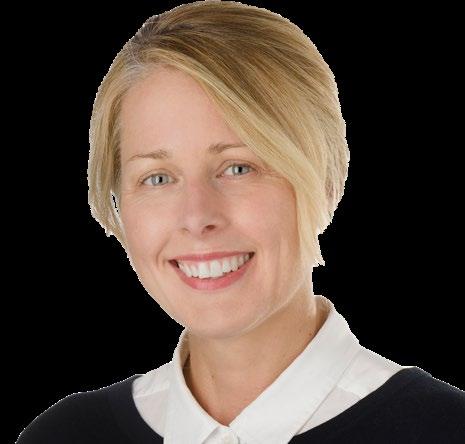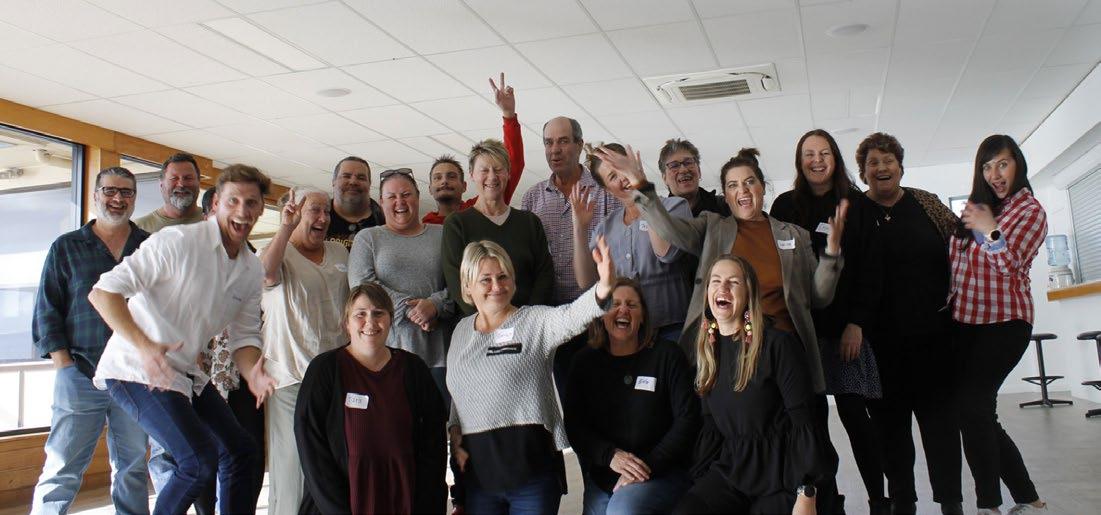
7 minute read
We Are Men
We Are Men uses the most powerful and ancient tool of story telling to destigmatise men’s mental health.
Focusing on connecting, engaging, and informing our communities Country SA PHN commissioned ROARA to create and deliver a digital campaign to assist in reducing the number of men who die by suicide and decrease the number of men who attempt suicide, while improving men’s mental health literacy and confidence to seek help when needed. ROARA knows the power of storytelling and its ability to change lives. Epiphany and Carl Mason travelled the world interviewing a person a day to produce the documentary 365 Docobites. They learnt from this experience the importance of connection and that people felt less alone sharing their story. They now work with lived experience people sharing their mental health journeys to do just that.
Advertisement
“Story telling is the most powerful and ancient way of destigmatising an issue and making people feel less alone,” said Epiphany.
“The difference between putting a statistic in front of someone versus story telling is profound.
We change minds with stories. We can all think of a time when a story has changed our perspective,” said Epiphany.
ROARA’s digital strategy used a 360-degree approach. The campaign content pieces connect with at-risk men in the region, funnelling them to a website with a
“You’ve just got to stick with it. It’s not a race.” Sean, Country South Australia
clear roadmap to support services and a loop back to a safe online social space for the community to connect - creating a holistic and effective approach.
Epiphany said recruiting six country South Australian men to share their own personal mental health stories for the digital campaign was a wonderful process.
“We easily found people who understood the power of storytelling. They have often been profoundly changed by storytelling themselves,” said Epiphany.
Even though they may be scared and of course there is a level of hesitation and stigma they may be fighting off. They always show up. They know how important it is.
It’s a joy to listen to them. They know how they can reach people through their lived experience and storytelling.
They’re aware that even if one person is affected by their story and thinks okay, I’ll go to my GP or even that I’m not alone, then they’re helping to change lives.”
Epiphany says when the participants spoke about their journeys, they spoke to their initial fears that they had felt was stronger in rural communities. But then when they did speak, they often felt that this initial fear may be more of a social construct. When they did share their stories, they actually didn’t face that stigma.
“Men are concerned men will think differently. But when you ask that same man how did you feel when someone else shared their story, they admired them and felt connected to them.
It’s an interesting dynamic. We’re not judging people, so we won’t actually be judged,” said Epiphany.
“Some of these may actually be residual fears. Now there is a lot of empowerment around mental health. We all have mental health.”
Shane Oakville was one of the lived experience participants who shared his story to help others realise they’re not alone.
“The more open people with illnesses or mental health problems are the more it takes the stigma away,” said Shane.
“There’s a big problem with pride and stigma in men and the more we talk about it the better it is for everyone else.” “I’m very positive about this. I’ve been through a pretty big journey, and I’ve come out of it with things that I have to look out for, but I’m doing okay overall.
The Country South Australian We Are Men initiative engagement was significantly higher than expectations. The campaign reached a total of 347,426 impressions in the region. ROARA’s original target was 73,020.
Epiphany said in their experience the level of support was unprecedented. People really rallied around the participants. The content and the lived experience story telling really resonated with people.
“We had so many positive comments thanking our participants for sharing. It makes it so much easier for them to reach out. They look at our participants and think if they can speak out so can I. He looks like me, he has a job like me, a family like me, lives in a similar community. I can relate to him and if he can share this so can I. I can do it too.”
“Sometimes it’s good to just let it all out.” Dwyane, Country South Australia
Dwyane


Michael

“I talk to counsellors, read books, exercise.” Hayden, Country South Australia “We all feel things. We’re all human.” Thomas, Country South Australia

“The first thing is, not to judge people.” Michael, Country South Australia
Thomas

Shane’s Story
“I had a mentor in the army that looked after us in my battalion for the first few months I was there. He came home one night, He was drunk, and I was sober, trying to tell him to shut up as you do. I woke up the next morning, and he had died.
After, I started getting really bad nightmares, and over the last 20 years, it got worse. I’ve gone through alcoholism, drugs, homelessness and I didn’t see it as a mental health problem because I thought I had everything under control, but obviously, I didn’t. At one point, I had to run 17kms to work because I couldn’t even afford a bike. I realised I had to seek professional help. I didn’t know I had PTSD until recently. I think that men are always looked at as stronger and that we can handle it, and I think with men we’d rather keep things to ourselves. Obviously, that affects not only us but the people around us as well. I was losing friends and particularly family. Once I started using services like psychologists, my head-space got a lot better.
A lot of people think that asking for help is a big thing. But at the end of the day, it’s the little things that count. My first step was a goal to save enough money for a TV. Would you believe it! I had nothing! And this was only eight years ago. Now I’m married, got my own house, car, it’s completely changed around.
I engaged myself in community groups, and tennis associations, just got myself a little bit more active and around people that were doing better than me. I’m a very passionate veteran, so I organised a dinner, raised $20,000 for a new war memorial and things like that that bring smiles to other people’s faces.
I still see my psychologist, and there’s no shame in seeing a psychologist. At the end of the day, he’s been wonderful. Conversation is the main thing. I feel that a lot of people with mental health problems sometimes aren’t really honest with close contacts. I think shame comes into it. So I think it is sometimes better to go out and look for that professional help or get into a group where you know no one, and you can start afresh and be honest with them.”

Mick you’re amazing. Your bravery in sharing this story could translate to saving lives. It also makes others think about how one small act of compassion can change the course of someones life. I think men & boys. particularly in the regional and country areas are shamed into locking up their emotions. I see so much more emotional insecurity in the regional areas, even in women.
People carrying burdens as they are afraid of the backlash of sharing their troubles and traumas. I hope over the years that this is changing course as we learn to become a more tolerant and compassionate, educated society. Certainly people like you sharing our story will help. Bless you. Kerrie, Facebook comment
Very brave to share mate. Good on you for being so strong. Kevin, Facebook comment
Hi Dwayne, good on you, love your post. Dawn, Facebook comment
Hugs to you Mick. Depression, suicide and suicidal thoughts needs to be openly discussed so the stigma associated with it can be decreased. Rob, Facebook comment

Love you and your talent Tom, you are an incredible young man. Janet, Facebook comment
You are an inspiration to many. Going above and beyond is evidence that you truly are amazing. Bev, Facebook comment
So much gratitude to you for sharing your story thank you. More awareness is needed to remove the stigma currently attached to mental health. Again thanking you for being brave. Debbie, Facebook comment

Population Health











